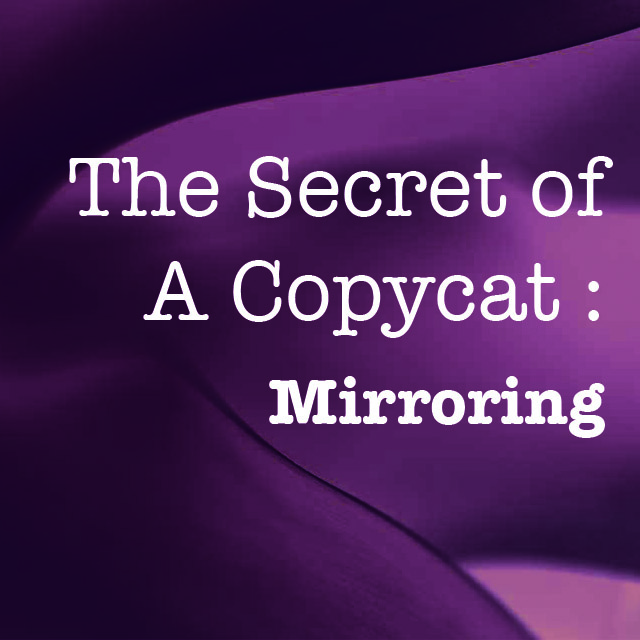It doesn’t take an expert to see anyone, all of the sudden, mirroring the behavior of someone close to them. Particularly in gestures, conversation style, even their voice tone. Some of us might witness a friend who mingled, or socialised virtually with their friends, replicates the most of their closest ones or of the most adored individual in the circle.
It could be the way their head nod, the use of a favorite jargon, tone of speaking, or even their preference in sense of humour.
I’ve learned recently that this mirroring behaviour had a scientific explanation.
What is Mirroring
Mirroring is a term in psychology, where an individual projected their action by imitating other who has the strongest influence to them. It is mostly played physiologically by your brain. Mirroring can be frequently become a subconscious actions. In some situations, it can be adopted from individuals that we faced constantly and for a long period of time. We can absorb our spouse’s speaking tone, replicate your best friend’s hand gestures when telling jokes, or reflect your daily co-worker presentation style in meetings.
It is also known as a sales technique in building rapport, when conducted deliberately. Building rapport aim to established good connection. Building rapport also sending an impression that you are on the same ground of understanding with the prospect client.
More about Mirroring :
Mirroring is the behavior in which one person unconsciously imitates the gesture, speech pattern, or attitude of another. Mirroring often occurs in social situations, particularly in the company of close friends or family. The concept often affects other individuals’ notions about the individual that is exhibiting mirroring behaviors, which can lead to the individual building rapport with others.-Wikipedia
Although there are mirroring effect that has been used deliberately as a sales technique to pursue a goal there are also the unconscious mirroring that can manifest on how intense his or her empathetic power. It starts basically from mimicking a harmless behaviour, up to the cost of absorbing other people’s emotions unselectively, despite of what they truly are. Real or fake, bad or good, for you.
The Coping Mechanism
Strong empathy can indicate a high level of emotional quotient, but it takes certain intelectual degree to appropriately manage and use it in daily conversation countering offensive words or sayings. It could be one of the empowering ammunition for validating another person’s story which is a significant stage in creating a feeling of acceptance. Read more on the importance of a validation here.
Further on, mirroring can also be a coping mechanism used by people who don’t function well in social situations. It is used as a way to feel accepted. Also to understand a person’s emotions better. On another level, some people wanted to expand the spectrum of their friendship. They used mirroring to bridge more connections.
How it happened.
“Funny, you start to talk like her..”
Physiologically the one responsible in working behind all of this replicating business is the “mirror neurons”. Birds,and primates have it. It turns out so does humans. This neurons are shooting themselves inside our brain when the process of copying other’s small details of interaction happened after an observation. The more we like what we see, we observed more rapidly.
Mirror Neurons enable us to reflect body language, facial expressions, and emotions. They are essentials for child development, building relationships, and comprehensive learning process.
Mirroring happens when the other party wanted to confirmed their process of understanding, a confirmation of being on the same page of communication.
The Resemblances.
The similarities between two individuals, can enhanced their characters beyond expectations. Finding resemblances in others is actually trying to create a walking mirror. Not all strangers can provoked certain traits of yourself. Either they bring out the best in you, or navigate the demons inside of you. That dark side in your mind-cage that needed to be seen for so long.
It is an automatic result from constant, and frequent bonding. The mirrored party felt like they share the same thoughts and maybe even the same brain.Not only it’s easier, but at the same time felt right, and gave the exact definition of the word “friend”.
As Karen Karbo, a famous american author, said in an article of Psychology Today:
“The conventional wisdom is that we choose friends because of who they are. But it turns out that we actually love them because of the way they support who we are.”
The Mirror of Negativity
Several stories on how a person can mirrored negativity from others like a fresh sponge, isn’t exactly good news.
I have a case story of a friend who actually mirrored her other friend’s habit. The habit is unfortunately hating main-stream things. Up to a point where they can go cold on you abruptly when you bring out any main-stream subject. Just to be define as “cool”.
Well, It’s not so cool anymore when you actually being difficult to your other friend, for making casual conversation.
Mirroring bad attitude is a loss to personality traits. Because sometimes we did it on an impulse. And because it is hard to trace the actual source, mirroring is similar to an act of empathy to anyone. It gives room of approval on polluted behaviour, without us knowing it. From excusing it to actually start to justifying it. A prove of how a constant close contact with those that possessed a toxic trait can altered your real character. Then, secretly create an unfortunate copycat.
So how do we tame it ?
Brain activity that are consistent with mirror neurons, has been found in some parts of the brain. The premotor cortex, the supplementary motor area, and a few other parts. Everything in the brain is actually interconnected. The activity of each cell, reflects the dynamic interactions with other brain cells and other neural systems.
You can have control over it, if you are discipline enough and pay attention closely. Unfold the true colors of the people you consider close to.
- Recognised and then do a censorship on what you experienced. Strong emotions (enthusiasm, irritation, grieve) of what your surrounding are projecting, from social media or direct meet, have implications. They can clouded your thoughts, and they can turned on certain moods you stored as long-time memory in your brain.
- A few experts agree that it all starts with a good eye-contact to grasp the meaning of a person’s emotion. it is the door to everything that leads to empathy. So if you sense a bad vibe coming your way from a friend, reduce the eye-contact. That way, your judgement of him/her can remain neutral, logical and not biased.
- Contemplate. Be brave to start a change when you know something isn’t good for you. You are always free to choose the company you wish to keep.
Author: Fraya
A writer and entrepreneur with profound interest in humankind research and insights. An avid coffee drinker and book hoarder. Hours and days spent in Jakarta.The Haptic Room is supported by our readers. Our site may contain links to affiliate websites, and if you make a purchase through these links, we receive a commission to support our site.


2 Replies to “The Secret of A Copycat : Mirroring”
Comments are closed.